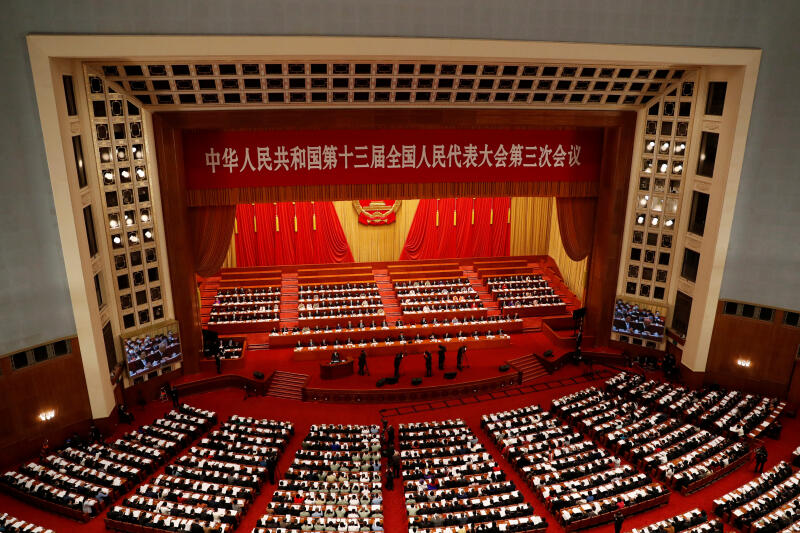China lawmakers to vote on Hong Kong law on Tuesday, says media
Sign up now: Get ST's newsletters delivered to your inbox

Hong Kong officials have defended the new law as necessary to maintain social stability after last year's protests.
PHOTO: REUTERS
Follow topic:
HONG KONG (BLOOMBERG) - China's top legislative body will vote on Hong Kong's security legislation on Tuesday (June 30) morning, the day before the city's handover anniversary, Now TV News reported, signalling Beijing may soon hand down a measure that pro-democracy activists and business groups say could erode the city's unique freedoms.
At a three-day meeting that started on Sunday, the National People's Congress (NPC) Standing Committee discussed the legislation to punish acts of secession, subversion, terrorism and collusion with foreign forces, Radio Television Hong Kong (RTHK) reporter earlier, citing Mr Ip Kwok-him, one of the city's non-voting delegates.
The proposed law includes a life sentence for acts of secession and subversion, according to the Now TV report, which cited unidentified people. The penalty would be far more severe than what the city's sole representative to the Chinese legislative body has suggested.
Prison sentences for the four types of crimes would range between three and 10 years and would be largely in line with Hong Kong's criminal laws, RTHK said last week, citing Mr Tam Yiu-chung, the city's only voting delegate in the committee.
Mr Albert Ho Chun-yan, former chairman of the city's Democratic Party, said the proposed sentence did not surprise him. Some people thought "it could have been the death penalty", he said.
"It is a shame that the so-called Hong Kong delegates just let the legislation go through like this," Mr Ho said. "It is also a shame for China - how can it face the world?"
Chinese President Xi Jinping's government announced plans in late May to impose the legislation on the former British colony following an unprecedented wave of protests last year. If the proposed law passes during this NPC session, it could come into effect in time for the symbolic July 1 anniversary of the city's return to Chinese rule in 1997.
Under the legislation, the central government would retain its authority in the city in three specific circumstances, Now TV said, without providing further details.
The NPC has received various opinions about the proposed law and will make "some adjustment", but the changes will not be substantial, Mr Ip told RTHK.
Mr Stanley Ng Chau-pei, another Hong Kong delegate with no voting rights who attended the meeting, told local television TVB that he had seen the latest draft of the legislation, and that the group discussion he sat in formed "consistent opinion" on the Bill.
He declined to elaborate on the contents of the legislation and was not sure if the three-day meeting would pass the Bill.
Pro-democracy politicians and foreign governments including the US have criticised the proposed law as a blow to the "one country, two systems" principle that keeps Hong Kong's legal system separate from the mainland. About 56 per cent of residents oppose the legislation, compared with 34 per cent who support it, according to a Reuters/ Hong Kong Public Opinion Research Institute poll released on Friday.
Hong Kong officials have defended the new law as necessary to maintain social stability after last year's protests, despite acknowledging they have not seen the full proposal.
Details released by state media last week showed that Beijing planned to set up a local intelligence bureau, take control of some sensitive cases and remove the court's ability to select judges on security matters.

